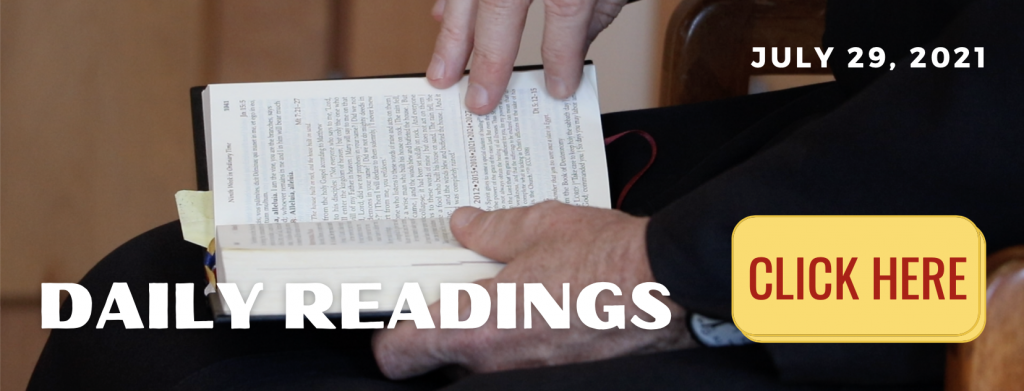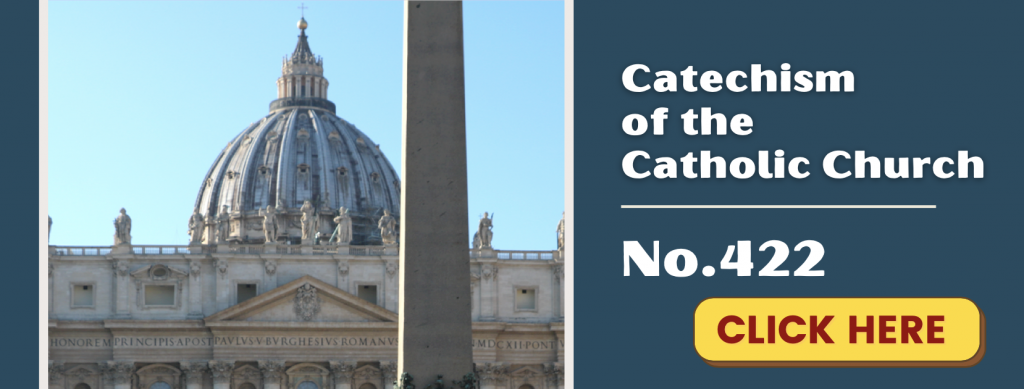Memorial of Saints Martha, Mary, and Lazarus



“For greater things you were born.” (Ven. Mother Luisita)
THURSDAY, July 29th Jn. 11: 19-27 R. Alleluia, alleluia. “I am the light of the world, says the Lord; whoever follows me will have the light of life.”
- In today’s Gospel, we see one of Christ’s greatest miracles, raising Lazarus from the dead after being in the tomb for four days!
- Upon seeing the cave where his friend, Lazarus, was buried, Jesus wept. Then Jesus commanded that they remove the stone blocking the cave. Martha objected. There is a reason they rolled a stone in front of that cave; there would be already be a stench from the rotting body.
- Jesus responded, “Did I not tell you if you believe, you will see the glory of God?” And we know what happened. The stone was removed and Lazarus walked out and was restored to his loving sisters!
- When we walk with the Lord, we walk in the light. Even the darkness is light in the presence of the Lord. Certainly we experience the light of the Lord in His merciful forgiveness in Confession. Even more so, we experience the light and glory of the Lord in the most Holy Eucharist – Jesus truly present in His Body, Blood, Soul and Divinity! There is a reason the chalice, the paten, and the tabernacle are of gold or silver – vessels proper to a King!
- We also find the light of Christ in prayer! Especially in the Psalms – which cover the whole gamut of human emotions and yearnings! It is here that Jesus, the Son of God made man, touches our hearts deeply with a love and compassion that knows no bounds! Let Fr. Ed take us on this journey from our head to our heart!
BLESSINGS THAT FLOW FROM THE PSALMS by Fr. Ed Broom, OMV
Throughout the centuries countless men and women have been enriched by the praying of the Psalms. Yes, men and women, the young and the old, the healthy and the sick, lay people, priests, Religious and consecrated souls have received countless blessings from the Psalms.
The blessings that flow from the Psalms are abundant, overflowing and timeless. Therefore, it is definitely worth our time, effort and reflection to call to mind these copious blessings. As we learned from the Psalms, “Give thanks to the Lord for He is good; His mercy endures forever” (Ps. 107:1), let us render a resonant thanks to God for enriching us with the praying of the 150 Psalms.
This article can easily be transformed into a prayer, most specifically a prayer of thanksgiving, offering to the Lord an attitude of gratitude. Indeed, let us imitate that one leper who returned to thank Jesus, out of the ten who were healed by the Divine Physician, and prostrate ourselves in spirit before the Lord to render Him a heartfelt THANK YOU, LORD!!!
THE COUNTLESS BLESSINGS THAT FLOW FROM THE PSALMS
1. LEARNING THE ART OF PRAYER: THE BEST OF PRAYER BOOKS!
My friends in the Lord, of all of the prayer-books ever composed, the Book of the Psalms is the “Prayer book par excellence.” Never has there ever been a more perfect prayer book for beginners, as well as for the proficient and well advanced in the spiritual life, than the Book of the Psalms. All of the most noble expressions in the art of prayer are expressed in the Psalms. Indeed, the Psalms is a true Gift from God to all of humanity!
2. ENCOUNTERING THE HOLY SPIRIT.
It is true that God used King David as one of the key instruments to compose the Psalms, however, the principal author of the Book of the Psalms is God Himself, the Holy Spirit. That being said, by praying the Psalms we encounter the Holy Spirit and His manner of communicating how we are to speak to God. The Psalms can transform us more and more into docile instruments in the Hands of the Holy Spirit.
3. LEARNING THE ART OF PRAYER—VARIOUS MODES OF PRAYER.
St. Teresa of Avila basically defines prayer as two friends spending time alone together in the art of communication. Intimate friends know how to communicate on various levels. Therefore, given that God wants to be our Best Friend, the Psalms teach us these various modes of expression, various modes or levels of communication. The following are examples of a few of these modes: praise and adoration, admiration and wonder, abundant thanksgiving, contrition and sorrow, supplication and petition, oblation and offering of oneself, and the honest expression of fears, worries, anxieties and doubts. Good friends can express themselves to an intimate friend on all of these levels. The same can be done with God. The Psalms offer us a sublime method, model and catalyst.
4. PSALMS AS LITURGICAL PRAYER: LITURGY OF THE HOURS.
When prayed in the context of the Liturgy of the Hours, the Psalms prayed as such become a formal part of the Official Prayer of the Church. This helps us to pray for the Church at large, as well as for the needs, conversion and sanctification of the whole world.
5. PRAY ALWAYS.
Jesus introduced the Parable of the Insistent Widow (Lk. 18: 1-8), to show his disciples that it is necessary to pray always and to never lose heart. One of the primary aspects and blessings that flow from the Liturgy of the Hours is the urgent exhortation of the Lord to pray not just sporadically, but to strive to pray constantly. The Liturgy of the Hours offers five different times in the day that we are beckoned to pray, so as to sanctify these different hours of the day.
6. PRAYER DISCIPLINE.
Saint Ignatius in the Spiritual Exercises states that one of the primary goals or purposes of doing the Spiritual Exercises is so that we might “order the disordered in our lives, so that we might discover God’s will in our lives and carry it out.” Praying the Psalms in an orderly, methodical and systematic fashion helps us to have greater discipline in our lives, greater harmony, as well as the ability to carry out our work with greater perfection.
7. IMITATION OF THE HOLY FAMILY.
Transporting ourselves back to the time of the Holy Family, Jesus, Mary, and St. Joseph, we come to the keen awareness that each member of the Holy Family prayed the Psalms. What could be a better goal in our lives than to strive to imitate Jesus, Mary and St. Joseph, most especially in the art and practice of prayer! Most likely Jesus, Mary, and St. Joseph prayed the Psalms as a family, in the Synagogue, on the way to the Temple, in the Temple of the Jerusalem, as well as personally and privately. How inspiring and consoling to know that we are praying the Psalms—the prayers—that Jesus, Mary and St. Joseph prayed constantly!
8. EXCELLENT PREPARATION FOR THE LITURGY OF HOLY MASS.
The graces and blessings indeed abound all the more! The graces that flow from the Sacraments, most especially from Holy Mass, are infinite. However, the graces that we receive depend on our disposition. In theology, this is termed dispositive grace. In other words, the better the preparation and disposition for Mass and Holy Communion, the more abundant the flow of graces. This being said, the prayer of the Liturgy of the Hours before Holy Mass, and as a preparation for Mass, can be a most sure and efficacious means to help us derive abundant fruit from the greatest prayer in the world, the Sacrifice of Calvary renewed, the Holy Sacrifice of the Mass.
9. PERSONAL, ECCLESIAL, AND FAMILY SANCTIFICATION.
All are called to holiness, to become saints. Jesus’ words are cogent, clear and convicting: “Be holy as your heavenly Father is holy.” Holiness flows from contact with God. Fervent prayer and the Sacramental life are two of the most powerful sources of grace. To reiterate, the Book of Psalms is the “Book of prayer, par excellence.” No doubt, if the Psalms are prayed methodically, systematically, fervently and attentively then one of the most superb fruits will be growth in holiness.
10. INEFFABLE SOURCE OF CONSOLATION.
There are times in our lives when we find ourselves in a state of desolation. That is to say, when we feel a cloud of sadness, darkness, loneliness, even a sense of futility invading our lives; it is at these times that the Psalms can console us with these or similar words: “The Lord is my Shepherd, there is nothing I shall lack… Even though I walk through dark valleys, you are there at my side with your rod and your staff.” (Psalm 23: 1, 4) How true! Many of the Psalms, and especially Psalm 23, can serve as light in the midst of darkness, hope when surrounded by despair, support when it seems as if everyone and everything is on the verge of collapsing and submerging into ruin. In the midst of desolation, opening up our heart to one of the many Psalms can encourage and convict us not to give up the struggle but to fight, to trust more confidently in the Lord who is with me at all times with His rod and His staff, to lead and to guide me along straight paths.
In conclusion, we invite all to undertake the most noble initiative and enterprise of praying the Psalms regularly! Pray them in any way you discern is best for you. Consult your Spiritual Director if you have one! The Psalms can be prayed from your Bible or in the context of the Liturgy of the Hours. They can be prayed in community with the Church or in your private prayer time. The Psalms can be prayed Morning, Midday, Evening or even before retiring for the Night. The key is simply this: to pray the Psalms. If prayed fervently and regularly, God will bless you most abundantly with peace, joy, spiritual insight, growth in holiness, and a sure pathway on the Highway to Heaven. With the Psalmist let us conclude: “Give thanks to the Lord for He is good; His love endures forever.” (Ps. 107:1)
Copyright 2021 Oblates of the Virgin Mary / St. Peter Chanel Church, Hawaiian Gardens, CA